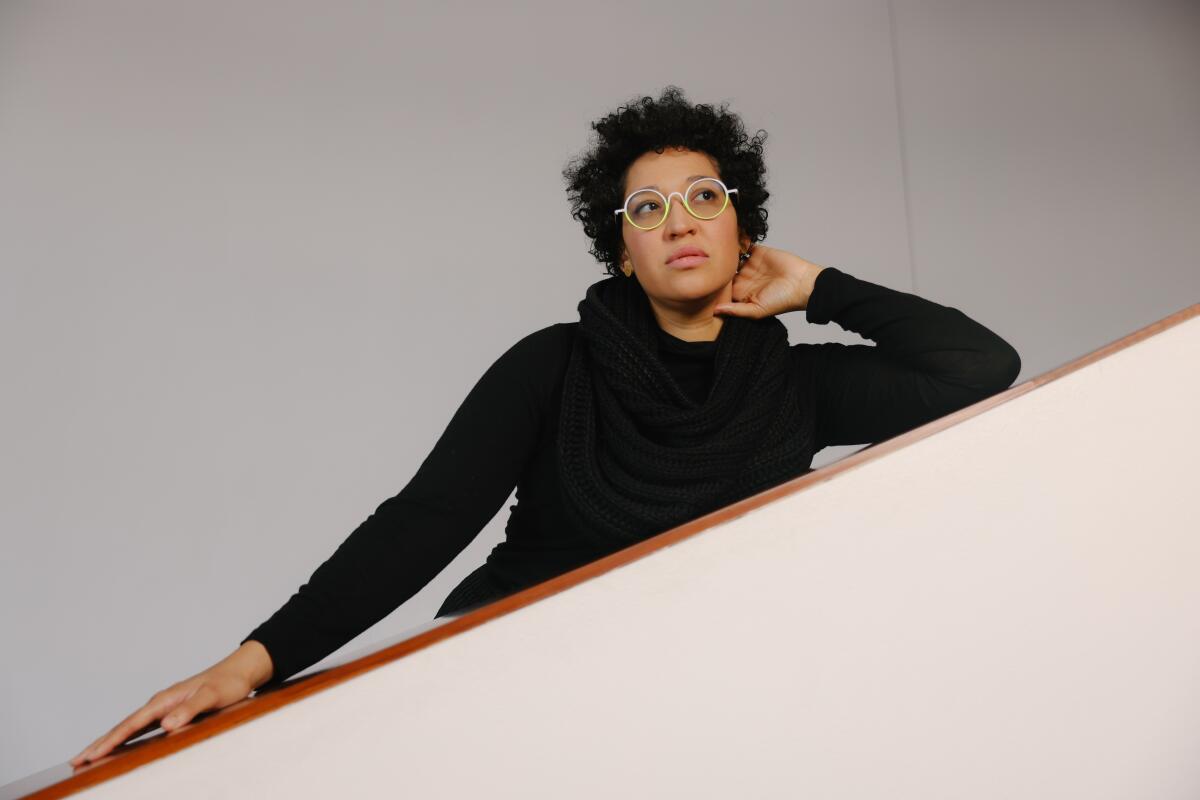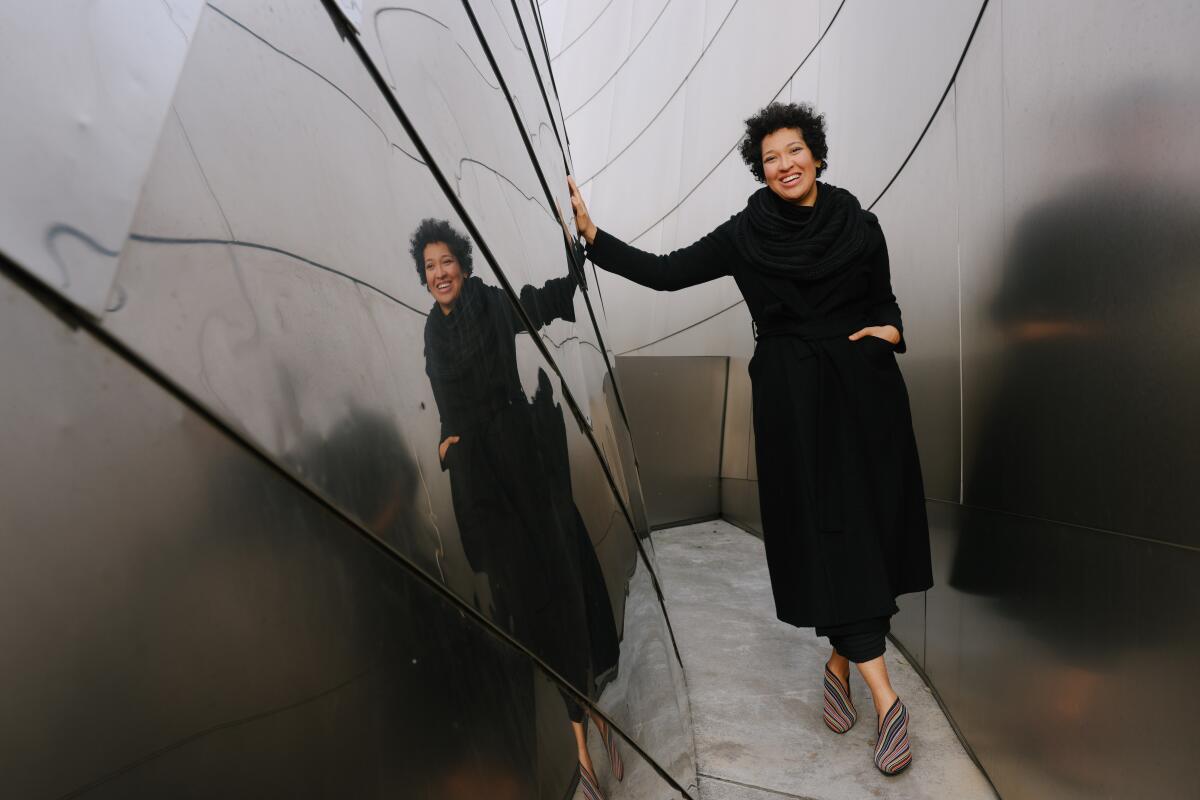Commentary: How Julia Bullock became an essential soprano for our times

- Share via
On the first 20 seconds of her first solo recording, “Walking in the Dark,” Julia Bullock sings: “When out of men’s hearts, hate is hurled / Maybe, baby, you’ll live in a better world.” She is unaccompanied. There isn’t a lot of emotion in the quietude of those 16 words uttered in arresting song; just enough to make you realize that the emotion has to come first from you, not her. Passive listening isn’t an option. You need to prepare. Bullock can, and she will, lay it on soon enough.
By the end of the first song, “Brown Baby,” the laying-on has begun, be it reaching toward hope or wrestling with despair — or both at the same time. Her voice is a resonant soprano, with hints of Nina Simone, Lorraine Hunt Lieberson and, in its intensity and presence, Maria Callas. Bullock brings the quality of oration to all she sings. Words are always in the spotlight. By the end of the recording, you just may feel the world ever so slightly differently, with your perception a little changed, your receptivity a little enhanced, your sense of wonder a little improved.
Bullock is appearing this weekend in the Los Angeles Philharmonic’s concert performances of John Adams’ opera “Girls of the Golden West,” which will be recorded by Nonesuch Records, the company that put out “Walking in the Dark” in December. She’s a familiar figure at the L.A. Phil, where she has appeared regularly, including singing and acting unforgettably in a production, “Night and Dreams: A Schubert & Beckett Recital,” in 2017 for the orchestra created by director Yuval Sharon. In November, Bullock co-curated the L.A. Phil’s “Rock My Soul” festival that centered on two neglected Black female composers, Florence Price and Margaret Bonds, with the intention to “engage with everything within and around you and find enjoyment while doing it.”
She wound up taking those words more seriously than she may have anticipated. It turned out she could not appear at the festival in person, remaining home, instead, with her husband, conductor Christian Reif, in Munich. On maternity leave, she had just given birth to her first child. When I met her last week at the L.A. Phil offices, I found her engaged with everything around her and immensely finding enjoyment while doing it. She had come with her 3-month-old son, to whom she delightedly yielded the spotlight.

“Girls” will be Bullock’s first major appearance on the West Coast in three years. She was supposed to sing at the Ojai Festival in June but tested positive for COVID-19 just before boarding the plane to L.A. from Munich. Because of her pregnancy, she was unable to star in the premiere of Adams’ latest opera, “Antony and Cleopatra,” for which she was the composer’s muse and which had its world premiere in San Francisco in September. Her first appearances since the birth of her son have been in Adams’ nativity oratorio “El Niño” in late December and singing a handful of songs in a New Year’s program in Hamburg, Germany.
But during lockdown Bullock remained an active online presence calling for inclusivity in the arts, opera in particular, and performing intense as ever even on Zoom, from home with her husband at their upright piano. And it was then that she recorded “Walking in the Dark.”
I asked Bullock, who has an ebullience and readiness to laugh, how she feels she might have changed vocally and artistically through all of this.
“Everyone talks about how giving birth is going to put you in a different place,” she replied. “I mean, whoa, how amazing. It’s been so gratifying. And it’s very interesting returning a little bit older to ‘Girls’ or any piece.”
Being a mother, she says, “allows another priority to enter in. There is enough time and space, as long as I’m not wasting it on that that I don’t actually find of value.” In that regard, Bullock may have changed very little.
In L.A. appearances — Julia Bullock at the Hollywood Bowl, Davone Tines at Monday Evening Concerts — they reveal opera’s future.
Adams created Dame Shirley in “Girls of the Golden West,” which had its premiere in San Francisco in 2017, for Bullock, who brought an exceptional radiance to the real-life woman who chronicled the California Gold Rush. The opera ends with Bullock singing an ode to the magnificent California sky.
It has been our sky under which Bullock also happened to, in some ways, find herself. Born in St. Louis in 1986 to a Black father, who was a head of housing and urban development in Eastern Missouri, and a white mother, also in city planning, the soprano says she grew up not in the arts but surrounded by them.
“I always knew I would be a performer,” she early on realized, “but I’m not quite sure where that came from. My dad had a beautiful voice.” Her mother liked to dance and took her to dance classes, including tap. But her father, who once shared a cell with Martin Luther King Jr., died when she was nine, and she grew up in a fraught city, ever encountering racism.
For the record:
11:19 a.m. Jan. 28, 2023An earlier version of this article stated that Bullock was born in 1987. She was born in 1986.
She’s not sure how, but as a young girl she came across videos of Peter Sellars’ opera productions, especially that of Handel’s late oratorio “Theodora,” staring Lorraine Hunt Lieberson, who became an inspiration for Bullock, and Dawn Upshaw, who became her mentor. Bullock studied with Upshaw at Bard College. When Upshaw was the artistic director of the Ojai Festival in 2011, she brought a handful of students along. Bullock made an instant impression.
It was at that festival that two crucial Peters came into her life. She met Sellars, a longtime collaborator with Upshaw. She had also around this time come to the attention of the director Peter Brook, who was staging a reduced version of Mozart’s “Magic Flute.” Brook invited Bullock to join the cast for a tour to South America and Mexico. Bullock had been accepted to the Juilliard School in New York, and was struggling to decide whether to follow her instincts or a career path.
“Julliard can wait,” she remembers Ara Guzelimian, then dean and provost of Julliard and now artistic director of the Ojai Festival, telling her. Brook’s production became what she describes as her first entry into the opera world.
“This was not about this large production or how much money was put into it,” she explained of the experience. “It was all about the human relationships that were created, between those of us onstage and the bonds that we built. Those things, I felt very palpably. I love that this humanist way of working and thinking about opera was my start.”
That is not exactly what Bullock then found at Juilliard. She describes Upshaw’s training at Bard as having been holistic, allowing her the space for broad cultural and vocal explorations. At Juilliard, the attention was on voice and what the voice will get you. She suffered under the pressure to the point of gagging when singing. But Sellars saw in her the next Hunt Lieberson and invited the still unproven and unconventional 23-year-old student to star in the provocative production of Henry Purcell’s “The Indian Queen” he was creating in Perm, Russia, and then taking to Madrid. Bullock’s performance proved a riveting star turn, as can be witnessed on the commercial video of the production that controversially contends with European colonialism, and she has never had to look back — or hold back in voicing her own societal concerns.
Nor has she pursued a conventional career. You will not find her singing “La Traviata” at the Metropolitan Opera, or likely at the Met, period. She is far more comfortable in the collective company, AMOC, working with such regular collaborators as baritone Davóne Tines, who also stars with her in Adams’ “Girls.”
She continues, as well, to work with Sellars, with whom she has been developing a music theater review, along with composer Tyshawn Sorey, about Josephine Baker and the racism the Black American singer faced as Parisian sensation in the 1930s. It was first workshopped at the Ojai Festival in 2016 and has now been developed into “Perle Noire: Meditations for Joséphine,” which will have its premiere as a full-scale production at Dutch National Opera in Amsterdam in March.
“What is unique about my relationship with Peter,” she says about Sellars, “is his allowing me my own creativity and space. Even as we have been putting together ‘Perle Noire,’ he has pretty much just said, ‘I want to give you a platform to present what you want.’”
“And, I have pretty much had my hands involved in every aspect of the piece now. Meanwhile he has watched the piece evolve from afar as I’ve continued to edit it and work on it with Tyshawn.” Bullock says she’s pleased how the project has gotten much bolder in the use of the dramatic text written by Claudia Rankine and the use of dance. Sellars told me he will only step in once they all get to Amsterdam.
But by this stage in her development, Bullock has also sought the space to find her own solutions apart from Sellars, which he encourages. Rather than seeming to follow in Sellars’ and Hunt Lieberson’s footsteps, Bullock sang in a new Royal Opera production of “Theodora” by Katie Mitchell at Covent Garden in London and made it spectacularly her own. “Antony and Cleopatra” is Adams’ first opera not directed by Sellars, and Bullock will finally assume the title role when Elkhanah Pulitzer’s production reaches Barcelona during the 2023-24 season.
But the fullest revelation of who Bullock is, right now, a fully formed artist in her mid 30s at her vocal prime, is “Walking in the Dark.” It is likely to be the first of many such solo recordings for Nonesuch, following the footsteps of the evergreen Nonesuch recordings by Upshaw, Hunt Lieberson and Audra McDonald.
The seven numbers go through a broad but consistent range. Let their titles tell the story: “Brown Baby,” “One by One,” “Memorial de Tlatelolco,” “City Called Heaven,” “I Wish I Knew How It Would Feel to Be Free,” “Knoxville: Summer of 1915,” “Who Knows Where the Time Goes.” Whether it’s capturing the rage and power of something inspired by Nina Simone, or a 1968 police massacre in Mexico City’s Tlatelolco district (from Adams’ “El Niño”), or the wistful sorrow of Samuel Barber’s setting of James Agee’s 1915 childhood self-searching, or ending with Bullock’s inimitable rendition of Sandy Denny’s wonderings, this is a snapshot of our time and a moment of Bullock’s that will always mean something.
That it came out at the same time she has given birth to a new life, of course, adds new urgency to the opening: “Maybe, baby, you’ll live in a better world.”
'Girls of the Golden West'
What: John Adams conducts the Los Angeles Philharmonic in his opera “Girls of the Golden West”
When: 8 p.m. Friday and 2 p.m. Sunday at Walt Disney Concert Hall, 111 S Grand Ave, Los Angeles, CA 90012
Tickets: $40-$216
Info: (323) 850-2000, laphil.com
More to Read
The biggest entertainment stories
Get our big stories about Hollywood, film, television, music, arts, culture and more right in your inbox as soon as they publish.
You may occasionally receive promotional content from the Los Angeles Times.











